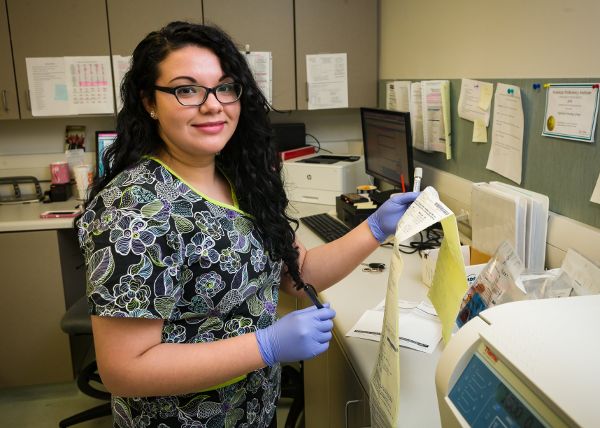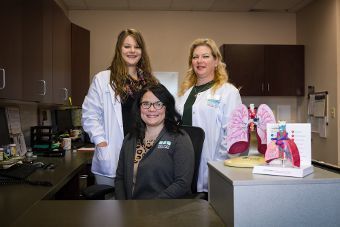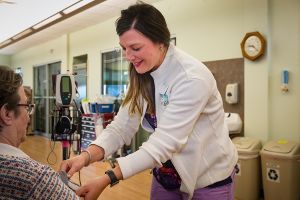Overview
Stomach or gastric cancer begins when cells in the stomach start to grow uncontrollably. A tumor can form when more cancer cells develop, and it can spread to other areas of the body. As it grows and spreads, the cancer becomes more advanced. These cancers often develop slowly, and pre-cancerous changes to the stomach which do not create symptoms are common.
The stomach is an organ which holds food and secretes enzymes and acids in order to complete the second step of digestion (after chewing). It is located just below the lungs and diaphragm in the upper abdomen. The stomach has several layers of tissue, including the inner lining, or mucosa, which creates the digestive enzymes and acids necessary for digestion, and a muscular layer which mixes the stomach’s contents and moves them to the next stage of the digestive process.
Types of stomach cancer include:
- Adenocarcinoma
- Over 90% of stomach cancers are of this type
- Lymphoma (see Non-Hodgkin’s Lymphoma)
- Gastrointestinal stromal tumor
- Carcinoid tumor
- Squamous cell carcinoma, small cell carcinoma, leiomyosarcoma (very rare)
Symptoms
Stomach cancer in its early stages rarely causes symptoms. It is important to note that the symptoms listed below can be caused by a number of other non-cancerous causes, but it is important to be checked by a medical professional with these symptoms.
Symptoms of stomach cancer may include:
- Poor appetite
- Unintentional weight loss
- Abdominal pain
- Discomfort in the abdomen, particularly above the navel
- Fullness when eating small meals
- Heartburn or indigestion
- Nausea
- Vomiting
- Abdominal swelling or fluid build-up
- Blood in the stool
- Anemia (low red blood cell count)
Risk Factors
Infection with the bacterium Helicobacter pylori is a major risk factor for stomach cancer. While many people carrying the bacteria will not develop cancer, H. pylori infection can cause chronic inflammation leading to pre-cancerous changes in the stomach, and it is associated with some types of stomach lymphoma.
Smoking approximately doubles stomach cancer risk. Dietary choices can also modify the risk of stomach cancer: large amounts of smoked food, salted meat or fish, pickled vegetables, and cured meats can increase risk, while plenty of fresh fruits and vegetables seems to decrease risk. Research suggests that being overweight and obese may be associated with some types of stomach cancer.
Stomach cancer is more common in men than in women, and much more common in people older than 50. It is also more common in people with Type A blood. Hispanic Americans, African-Americans, Native Americans, and Asian Americans are at higher risk than whites. Stomach cancer occurs more frequently in Japan, China, Southern Europe, Eastern Europe, Central America, and South America than in North Africa, West Africa, South/Central Asia, and North America.
Occupations in the coal, metal, and rubber industries have been associated with a higher risk of stomach cancer.
Certain conditions can increase the risk of developing stomach cancer (for more detailed information about these conditions and gene mutations, visit the American Cancer Society website):
- Previous stomach lymphoma (which likely indicates infection with H. pylori)
- Previous stomach surgery removing part of the stomach
- Pernicious anemia
- Menetrier disease or hypertrophic gastropathy
- Hereditary diffuse gastric cancer: those inheriting the gene mutation associated with this syndrome are very likely to develop stomach cancer
- Lynch syndrome or hereditary non-polyposis colorectal cancer (HNPCC)
- Familial adenomatous polyposis (FAP)
- BRCA1/BRCA2, also a risk factor for breast cancer
- Li-Fraumeni syndrome
- Peutz-Jeghers syndrome (PJS)
- Family history of stomach cancer
- Adenomatous stomach polyps (most other types of polyps do not seem to increase stomach cancer risk)
- Epstein-Barr virus (EBV) infection, which causes mononucleosis (known as mono)
- Common variable immune deficiency (CVID)
Prevention
While some risk factors, such as age, gender, and race cannot be controlled, there may be some things you can do to lower your risk of stomach cancer:
- Treat H. pylori infection if you have it
- Refrain from or stop smoking
- Maintain a diet high in fresh fruits and vegetables
- Engage in regular physical activity
- Maintain a healthy weight
- Take aspirin or another NSAID, if your doctor thinks it is appropriate for you
- Those suspected of having hereditary diffuse gastric cancer syndrome or Lynch syndrome, which greatly increase stomach cancer risk, should discuss genetic testing and prevention with their doctor
Diagnosis
Stomach cancer is usually diagnosed after a patient visits the doctor with symptoms. If cancer is suspected, a detailed medical history and physical exam will be performed. Your doctor will ask questions about your risk factors and family history. The physical exam will include an examination of your abdomen. You may be referred to a gastroenterologist for further testing.
Upper endoscopy is usually used to confirm a diagnosis of stomach cancer, and may be combined with endoscopic ultrasound or a biopsy. Imaging tests including CT, MRI, PET, X-ray (including an upper gastrointestinal series) may be used throughout diagnosis and treatment.
Other tests may be used in addition to the diagnostic tools discussed above. These include laparoscopy, blood tests, and other lab tests.
Treatment
The treatment plan will depend on the stage of the cancer, as well as other factors. Our doctors will work closely with you and your family determine the best treatment plan for you. Options for treatment could include:
- Surgery
- Chemotherapy
- Targeted therapy
- Immunotherapy
- Radiation therapy
Your doctor may decide more than one of these treatment options will be in your best interest.







